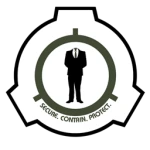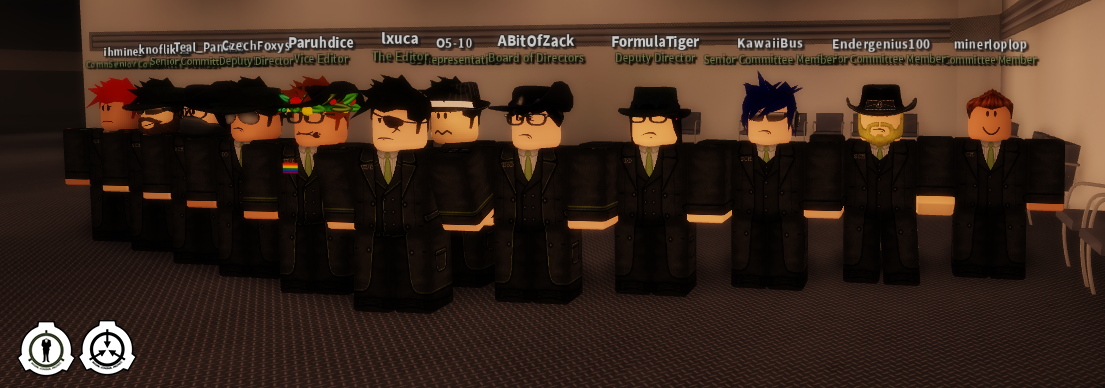Ethics Committee (CreepySins)
Ethics Committee | |
|---|---|
 | |
| Information | |
| Type | Civil |
| Abbreviation | EC |
| Group | Open link |
| Group Id | 4095963 |
| Leadership | |
| Overseer | Robin_Nox |
| Director of Ethics | Ero_CZ |
The Ethics Committee is a civil department within CreepySins SCPF, that has been established at the founding of the SCPF. It is represented by a member of the O5 Council, and has both on-site and off-site duties. The Ethics Committee is tasked with the enforcement of foundation law, specifically ethical violations. It is lead by the Director of Ethics, Ero_CZ. The Ethics Committee has public guidelines[1].
Structure
The Ethics Committee has a traditional structure with entry, employee, management and directorate ranks.
| Overseer of Ethics | |
|---|---|
| Abbreviation | O5-9 |
| Member of | O5 Council |
| Appointer | Office of the Overseer Council |
| Constituting instrument | Framework |
| Precursor | Director of Ethics |
| First holder | ConerSins[2] |
| Director of Ethics | |
|---|---|
| Member of | Board of Directors |
| Reports to | Overseer of Ethics |
| Appointer | Office of Ethical Management |
| Constituting instrument | Framework |
| Rank | Type | Clearance | Description |
|---|---|---|---|
| Director of Ethics | Directorate | Level-5 | Director of the department, tasked with leadership and upper-management duties. General oversight over the committee and punishments handed out. Holds a veto power for investigations and committee processes. |
| Assistant Director of Ethics | Level-4 | Assistant Director, assisting the director with leadership and maintenance. General oversight over the committee and punishments handed out. | |
| Chief Secretary | Management | Level-3 | Leader of one of the subcommittees, tasked with the management and leadership of them. They are the chief of their segment and the corresponding duties to it. |
| Secretary | Assistant leader of one of the subcommittees, tasked with general day-to-day management of committee procedures and maintenance of smooth functioning. | ||
| Senior Constituent | Employee | Level-2 | Senior employee of the committee, and part of the general workforce. Senior Constituents are part of one subcommittee and are given more privileges and have a higher reputation. Senior Constituents also take part in training Students. |
| Ethical Constituent | Ethical Constituents resemble the general workforce of the Ethics Committee, being part in a subcommitte. This is the standard rank within the committee. | ||
| Ethical Staff | Ethical Staff resemble the general workforce of the Ethics Committee, though they are not part of a segment and only have on-site duties. Most members of the committee only stay in this rank for a limited amount of time as they wait for their admission in a subcommittee. | ||
| Student | Entry | Level-1 | Students are new employees within the Ethics Committee, awaiting their training and full admission to become a fully-fledged member of the Ethics Committee. |
Subcommittees
The Ethics Committee has two subcommittees (officially called "Segments"), the judicial and investigative subcommittee. Employees wanting to advance beyond the "Ethical Staff" rank are required to be part of a subcommittee. Directorate members and the Overseer are not part of a subcommittee.
The investigative segment sits at the forefront of the committee, admitting cases, processing them, and initiating investigations[3]. Members of the investigative segment are authorised to host interrogations and questionings, and are the first ones to touch a report during processing.
The judicial segment processes the report at last, reviewing evidence and deciding for a verdict and punishment. The judicial segment is the only judiciary body within the foundation[4], though not the only appelate body. In the past, the judicial segment has held appellate hearings alongside the O5 Council for punishments given through the Ethics Committee. This sparked controversy, as the members of the board were part of the segment that has convicted the defendant in the first place. This practice was later abolished, with the O5 Council remaining the only appelate body.
The appellate board is a segment/subdivision was in works for some time, but was ultimately dismissed in favour of the Board of Directors hearing the appeals.
Subdivisions
The Ethics Committee hosts one subdivision, Human Resources. The division is currently inactive[5]. The purpose of it was to reduce the number of Class-E sentences issued for violations committed on department teams by negotiating alternate punishments with department command[6].
Enforcement duty
See main article (Legal System (CreepySins))
The Ethics Committee is the primary enforcement body within the foundation and takes jurisdiction of all ethical violations. The enforcement process is initiated either by report of a witnessing or affiliated party of the violation, or by observation of a member of the Ethics Committee. The latter represents an initiation ex officio. There are no legal obligations for the Ethics Committee to become active or pursue a case to formal termination. As there knowledge of the incidents existence suffices the initiation of an enforcement process, revoking the report is not possible. An enforcement process ends with acquittal, dismissal, pardon or conviction. Every enforcement process is linked to a case, named after the defendant. Segments may utilise own identifying mechanisms, such as case IDs.
Investigation
The Ethics Committee assigns an investigator to a case at the beginning of the enforcement process. The investigator is the first individual to formally charge the defendant. The charges pressed by the investigator are not binding to the judicial segment. Evidence is reviewed at this stage and assessed for validity. The investigator may then interrogate the defendant and question witnesses of the incident. The Ethics Committee tends to question all present parties, even if there is no tangible reason to do so. The Ethics Committee gives the questioned witnesses the option to remain anonymous. Transcripts of the questioning are then only released with a censored username, though the Ethics Committee may choose to list them as a witness in the Class-E request.
Adjudication
The Ethics Committee houses the judicial segment, which is the prime judiciary body of the foundation. In this phase, adjudicators review the case fully. Adjudicators may choose to modify charges pressed by the investigator. The case is then voted on for a verdict, which may be guilty or not guilty. Further non-verdict vote options are Abstain, used when an adjudicator is involved in the case themselves or has significant bias towards one of the parties, and Inconclusive, which is used when the Adjudicators have further questions remaining. Inconclusive votes have the intention of sending the case back to the investigative segment for further investigation.
The not guilty verdict is only used if there is not enough evidence to sufficiently prove a violation. All provable violations, even if minor, receive the guilty verdict. The Ethics Committee may decide between a Formal Warning, temporary Class-E and permanent Class-E as punishment for a guilty verdict. Punishments are carried out by the Secretary of the Judiciary. Formal Warnings are considered unreal punishments, as they are not logged and do not have any effect. These are mostly used when a violation has occurred, but the findings are too minor to warrant a Class-E.
History
The Ethics Committee has been established with the founding of the foundation, as it is a vital department. The department has received their overseer during the first O5 generation, beginning with ConerSins[7]. In the past, the Committee named their Director "The Editor", and the Assistant Director "Vice Editor". The Ethics Committee featured the Board of Ethics, though not much knowledge about its purpose remains. It was supposed to be quite powerful.
After a remake somewhere between 2018 and 2021, the Ethics Committee featured a ranking system similar to that of a government. Here, the ranks "Ethical Staff", "Ethical Constituent" and "Senior Constituent" were born. Though, the directorate ranks were "President" for the director, and "Governor" for the Assistant Director. These ranks were changed to the current form at an unknown time.
The committee underwent multiple changes in leadership. Changes of councilor and director were not recorded.
Controversies
The Ethics Committee is often in the public's gossip due to the nature of their tasks, with controversial sentencing occurring quite often.
Ethical Inquiry #2
Ethical Inquiry #2 is an ethical inquiry of the Ethics Committee about the necessity and purpose of the two combative enforcement divisions, the Internal Monitoring & Enforcement Agency ("IME") and Iota-10[8]. After completion, the inquiry was published. The inquiry featured opinions of committee members, most of which were not too friendly of these enforcement divisions. As a result, multiple members of the Mobile Task Forces have voiced disagreement with this inquiry.
References
- ↑ Ethics Committee Main Information Hub
- ↑ https://docs.google.com/spreadsheets/d/1QkV-hLEQeBXq3kY20MUw4PIAQXW-2XEJEH3nrPCiWH8/edit?gid=0#gid=0
- ↑ The Investigative Segment
- ↑ The Judicial Segment
- ↑ Human Resources Group
- ↑ Creation of the Human Resources Subdivision in #⤷council_bulletin.
- ↑ O5 History Sheet (decommissioned)
- ↑ Ethical Inquiry #2
